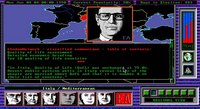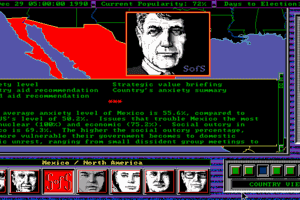

Shadow president install#
Bill Clinton arguably broke the mold through his efforts to install his wife as president, but even that ambitious enterprise was centered in New York, not Washington. Bush splits his time between Houston and Maine his son George W., a full-time Texan, paints.
Shadow president professional#
Richard Nixon skulked off to California and reengineered himself as a statesman, Gerald Ford made himself rich, and Jimmy Carter became a professional humanitarian. Now it’s my time!” He went to his ranch, grew a ponytail, and died within three years. In 1969, Lyndon Johnson lit his first cigarette in 15 years, telling his daughters, “I’ve now raised you girls. Dwight Eisenhower retired to Gettysburg, eight years later. Harry Truman retired to Missouri, broke, in 1953. Unlike Obama, he was in no position to assert his postpresidential authority or impose himself as a presence on the national stage. But Wilson was an invalid-indeed, he spent the last 18 months of his presidency in seclusion, with his wife largely managing the affairs of state. Stroke victim Woodrow Wilson took up residence on S Street-just a few blocks away from the Obamas’ new Kalorama home. In the modern era, only one other former president remained in Washington after his term of office ended. Andrew Jackson and Martin Van Buren went home, too, when their terms in the White House were finished.

True, John Quincy Adams, finding retirement dull, soon returned to public service as a congressman, a role he embraced and thrived in, but his ambitions were not imperial. Though he stayed abreast of national events and voiced his opinions to his associates, he stayed out of the affairs of government keeping a safe physical distance from the capital reinforced that resolution.įollowing Washington’s model, John Adams, Thomas Jefferson, James Madison, and James Monroe each returned to their farms, in varying degrees of insolvency. Mount Vernon had gone to seed, and Washington was forced to shore up his personal finances. Washington’s diaries and correspondence of 1797 are consumed with matters of housekeeping, husbandry, and accounts. The American ideal of a president is essentially republican: a citizen steps forward to serve the government and returns to private life when his term is up. Washington repeated his valiant act when he declined a third term as president-Garry Wills calls him a “virtuoso of resignations”-and set the standard for future executives by going home when his political work was done. After relinquishing his commission as general following victory over the British, George Washington was compared with Cincinnatus, the retired Roman general who assumed emergency powers, saved Rome, and then returned to his plow. Conscious of threats to the safe transfer of executive power in the young republic, America’s early presidents departed Washington on the expiration of their terms. Obama’s move breaks with long-standing precedent. Obama’s postpresidency is thus shaping up to be virtually unique in American history: rather than departing Washington, he is planting his flag there, establishing, in effect, a shadow presidency. At first, the Obamas presented their choice as temporary-they wanted to let their younger daughter, Sasha, finish high school in Washington, they said-but their purchase of an 8,200-square-foot, $8 million mansion suggests a permanent stay.

In Obama’s case, though, the new residence is in Washington, D.C. After leaving the White House in January 2017, Barack Obama and his family set out to do what all newly retired presidents have done-go back home, or find a new one.


 0 kommentar(er)
0 kommentar(er)
